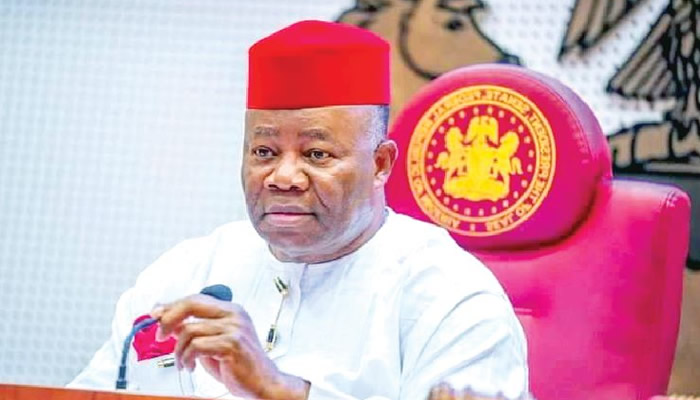The President of the Senate, Godswill Akpabio, has announced that the 2022 Electoral Act will be amended to allow statutory delegates to participate in political parties’ primaries for the 2027 general election.
This amendment, Akpabio explained, seeks to address an important oversight in the previous electoral law.
Speaking during a meeting with the national leadership of the Nigerian Bar Association (NBA) in Abuja on Monday, Akpabio highlighted that the omission of statutory delegates from the primaries under the 2022 Electoral Act had created significant issues.
He referred to this oversight as a mistake that must be rectified to ensure a more inclusive and balanced democratic process in future elections.
Akpabio noted that the exclusion of key political figures, such as the President, Vice President, Governors, Deputy Governors, Senate President, Deputy Senate President, and members of Parliament, from participating in the primaries had led to the creation of what he called “super-delegates” during the 2023 elections and 2022 party primaries.
“There were defects in the last Electoral Act that was amended. We inadvertently created what I may call super-delegates in the 2023 elections and 2022 primaries,” Akpabio explained.
“Without any particular intention, we excluded key political figures from voting, and only ad hoc delegates were allowed to participate. This, in turn, limited the democratic process and led to imbalances in candidate selection.”
The Senate President emphasised that all statutory delegates—ranging from the President and Vice President to local government chairmen—had been left out, thus restricting the range of voices in the selection of flag bearers for legislative, gubernatorial, and presidential elections. He pointed out that only those who contested to become ad hoc delegates were allowed to participate, creating a skewed process.
“These are areas that we think we can look at to make our democracy more participatory,” Akpabio said. “Democracy is all about numbers, and by excluding these critical figures, we limited representation and participation in the primaries.”
Furthermore, Akpabio raised concerns about the role of the Independent National Electoral Commission (INEC) in candidate selection. He argued that political parties should have the final say in choosing candidates who align with their manifestos and have a proven record of service to the people, rather than relying on INEC to decide who qualifies as a candidate.
“We need to review the powers given to INEC. At one point, it seemed as if INEC was the ultimate arbiter in deciding who could run as a candidate,” Akpabio explained.
“Political parties should have the power to select candidates who will best represent their manifesto, have integrity, and a proven track record of performance.”
In addition to electoral reforms, Akpabio addressed the issue of quackery in the legal profession. He urged the NBA to take more robust action to rid the profession of unqualified individuals, some of whom had even risen to senior positions within the bar.
READ ALSO: SENATE: Apologise and be forgiven, Akpabio tells Natasha
He stressed that this undermined the integrity of the legal system and called on the NBA to take a stronger stance against such practices.
During the meeting, the National President of the NBA, Afam Osigwe (SAN), also called on the National Assembly to include justice sector reforms in the ongoing constitutional amendments. He shared an anecdote from the 1990s when he encountered a quack in the Igbosere Magistrate Court in Lagos, a person who had studied History at the University of Calabar but claimed to have studied Law.
Both Akpabio and Osigwe’s remarks underline the ongoing efforts to address electoral and professional challenges, aiming for a more inclusive, accountable, and transparent system in Nigeria.



